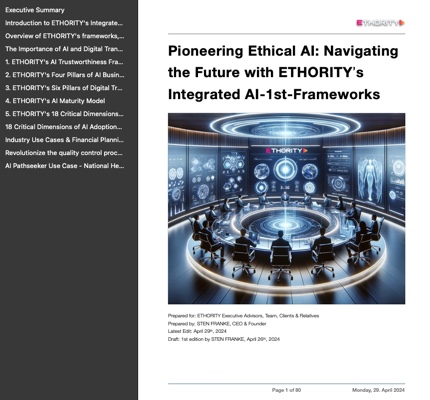In the ever-evolving realm of artificial intelligence, ensuring the ethical deployment and governance of AI systems is paramount. As AI technologies advance, so do the complexities and potential risks associated with their use. ETHORITY’s “10 Ethical AI Issues” is an in-depth exploration designed to provide a sophisticated understanding of the critical components of ethical AI research.
Introduction to Ethical AI Research
Structured Approach: ETHORITY’s approach to ethical AI research is meticulously structured, guiding organizations through the multifaceted landscape of AI ethics. Each component is systematically addressed, ensuring that all aspects, from security and privacy to explainability and bias mitigation, are comprehensively covered.
Transparent Framework: Transparency is at the core of ETHORITY’s methodology. By utilizing clear, accessible frameworks and tools, we enable stakeholders to understand and implement ethical practices with confidence. This transparency ensures that AI systems are developed and deployed in an accountable and trustworthy manner.
Engaging Content: Our educational content is designed to be highly engaging, incorporating real-world examples, interactive elements, and practical applications. This approach captures diverse stakeholders’ interests and facilitates more profound understanding and retention of ethical AI principles.
Nuanced Understanding: AI ethics is a complex field requiring nuanced understanding and consideration. ETHORITY’s framework delves into the subtleties of ethical AI research, addressing both functional and non-functional aspects. This includes tackling challenges such as data inconsistencies, susceptibility to manipulation, and the necessity of regular ethical reviews.
Critical Components of AI Ethics & Ethical AI Frameworks:
- Security:
- Tools and Metrics: Penetration testing tools, anomaly detection systems, and cryptographic techniques to ensure data and model integrity.
- Frameworks: Establish protocols for regular security audits and resilience testing against adversarial attacks.
- Privacy:
- Tools and Metrics: Differential privacy, federated learning, and data anonymization techniques.
- Frameworks: Implement privacy-preserving protocols and compliance with regulations like GDPR and CCPA.
- Explainability:
- Tools and Metrics: Model interpretability tools such as SHAP (Shapley Additive exPlanations) and LIME (Local Interpretable Model-agnostic Explanations).
- Frameworks: Develop guidelines for transparency, ensuring stakeholders understand model decisions and operations.
- Bias Mitigation:
- Tools and Metrics: Fairness indicators, bias detection algorithms, and balanced data sampling techniques.
- Frameworks: Regularly audit models for fairness, use diverse and representative training datasets, and involve multidisciplinary teams in model development.
- Calibration:
- Tools and Metrics: Calibration plots, reliability diagrams, and techniques such as isotonic regression to ensure probabilistic predictions are accurate.
- Frameworks: Incorporate calibration steps in the model training and evaluation process to ensure confidence scores reflect true likelihoods.
Comprehensive Mechanisms for Testing Ethical AI Models:
- Functional Testing:
- Objective: Verify that the AI model performs its intended tasks correctly and meets performance benchmarks.
- Methods: Unit testing, integration testing, and system testing using real-world scenarios.
- Non-Functional Testing:
- Objective: Assess aspects such as the AI system’s scalability, reliability, and usability.
- Methods: Stress testing, load testing, and user experience evaluations.
Addressing Ethical AI Issues in AI Models:
- Data Inconsistencies:
- Approach: Implement rigorous data validation processes, use data versioning systems, and employ continuous data quality monitoring.
- Vulnerability to Manipulation:
- Approach: Deploy adversarial training, develop robust detection mechanisms for data poisoning attacks, and ensure secure model deployment practices.
Ethical AI Implementation Strategies:
- Ethical Reviews: Conduct regular ethical reviews involving diverse stakeholders to identify and mitigate potential risks.
- Transparency and Accountability: Maintain clear documentation of model development processes and decision-making criteria.
- Stakeholder Engagement: Involve end-users, ethicists, and domain experts in the development and deployment stages to ensure the AI system aligns with ethical standards and user needs.
- Regulatory Compliance: Stay updated with and adhere to international and local regulations governing AI use and data protection.
Ethical AI Issues: Real-World Examples and Implications
Despite the potential benefits, AI, particularly generative AI, can exhibit negative bias or be untrustworthy. Here are notable non-ethical use cases highlighting the importance of robust ethical frameworks:
1. Ethical AI Issue: Copyright Infringement in AI Training
Example: In September 2023, OpenAI faced a lawsuit for allegedly using copyrighted material without permission to train its models. This case highlights significant issues surrounding intellectual property rights and AI.
Details: The lawsuit claims that OpenAI’s models were trained using large datasets that included copyrighted content from various creators without proper authorization or compensation. This raises ethical concerns about the ownership and usage of data in AI development.
Sources:
- TechCrunch: Details the lawsuit and its implications for AI and copyright law: Generative AI and copyright law: What’s the future for IP?
- The Verge: Explores the broader impact of lawsuits on AI development and intellectual property rights: “A California judge dismissed nearly all claims laid out in a lawsuit that accuses GitHub, Microsoft, and OpenAI of copying code from developers.”
2. Ethical AI Issue: Biased Outcomes in Facial Recognition
Example: AI-driven facial recognition systems have been shown to exhibit significant bias, particularly along racial lines, leading to wrongful arrests and convictions of minorities.
Details: Studies have revealed that facial recognition systems are less accurate in identifying individuals with darker skin tones. This has resulted in numerous incidents where innocent individuals, primarily from minority communities, have been wrongly implicated in criminal activities.
Sources:
- MIT Technology Review: Examines the racial biases in facial recognition technology and its real-world consequences: “The movement to limit face recognition tech might finally get a win”
- NewYorkTimes discusses cases of wrongful arrests due to biased facial recognition systems: “Facial Recognition Led to Wrongful Arrests. So Detroit Is Making Changes. The Detroit Police Department arrested three people after bad facial recognition matches, a national record. But it’s adopting new policies that even the A.C.L.U. endorses.”
3. Ethical AI Issue: Creation and Misuse of Deepfakes
Example: Generative AI can create highly convincing deepfakes, distorting truth, influencing public opinion, and posing significant national and international security threats.
Details: Deepfakes have been used to create realistic but false videos of public figures, spreading misinformation and potentially inciting violence or political instability. The ability to manipulate visual and audio content with such precision raises serious ethical and security concerns.
Sources:
- BBC explains how deepfakes are made and their potential dangers.
- Homeland Security PDF explains: “Increasing Threat of DeepFake Identities – The most common techniques for creating deepfakes are represented on the timeline. The first type, which pre-dates deepfake and AI/ML technology, is the face…”
4. Ethical AI Issue: AI in Phishing Scams
Example: AI is being used to enhance phishing scams, enabling fraudsters to craft more convincing messages and carry out large-scale attacks.
Details: AI can analyze large datasets to create personalized phishing emails more likely to deceive recipients. This increases the success rate of phishing attacks and poses significant risks to cybersecurity.
Sources:
- Forbes details how AI is transforming phishing scams and the associated risks in “AI’s Double-Edged Sword: Managing Risks While Seizing Opportunities.”
- Wired explores the rise of AI-driven phishing and its impact on cybersecurity: “The Future of AI-Powered Cybersecurity With automated attacks on the rise, a point-solution approach to security is no longer sufficient. Here’s how AI and machine learning can help deliver end-to-end solutions to stay one step ahead of the bad guys.”
5. Ethical AI Issue: Ethical Concerns in AI Development
Example: Even with good intent, AI development can lead to biased data and outcomes, issues with transparency and accountability, concerns over data privacy and security, and challenges related to plagiarism and misinformation.
Details: Bias in training data can result in unfair and discriminatory AI outcomes. Additionally, the lack of transparency in AI decision-making processes and the potential for misuse of personal data are significant ethical concerns.
Sources:
- Brookings Institution discusses various ethical issues in AI development and deployment: “Ethical AI development: Evidence from AI startups.”
- AI Now Institute provides research and analysis on the ethical implications of AI technologies: “…move from identifying and diagnosing harms to taking action to remediate them. This will not be easy, but now is the moment for this work.”
6. Ethical AI Issue: AI Impact on the Future of Work
Example: AI’s role in automating tasks could significantly alter job markets and employment patterns, raising questions about job displacement and new forms of work.
Details: As AI systems take over more tasks traditionally performed by humans, there is a risk of significant job losses in specific sectors. To mitigate the impact, new skills must be developed, and new job opportunities must be created.
Sources:
- World Economic Forum explores how AI is transforming the workplace and the implications for the future of work: “JOBS AND THE FUTURE OF WORK AI: 3 ways artificial intelligence is changing the future of work.”
- McKinsey & Company analyzes the potential impact of AI on employment and the economy: “Generative AI is poised to unleash the next wave of productivity. We take a first look at where business value could accrue and the potential impacts on the workforce.”
7. Ethical AI Issue: AI in Criminal Justice and Law Enforcement
Example: Use of AI for predictive policing and criminal sentencing can perpetuate systemic biases, affecting minority communities disproportionately.
Details: AI systems used in law enforcement and criminal justice can reinforce existing biases in the data they are trained on, leading to discriminatory practices and unjust outcomes.
Sources:
- The Atlantic examines the impact of AI on criminal justice and the potential for biased outcomes: “Can AI Improve the Justice System? A fairer legal system may need to be a little less human.”
- ACLU discusses the ethical concerns surrounding predictive policing and its impact on minority communities: ” Statement of Concern About Predictive Policing by ACLU and 16 Civil Rights Privacy, Racial Justice, and Technology Organizations.”
8. Ethical AI Issue: AI in Healthcare
Example: Potential biases in AI-driven diagnostics and treatment recommendations can lead to healthcare disparities, especially for underrepresented groups.
Details: Biases in healthcare data can result in AI systems providing less accurate diagnoses and treatment recommendations for specific populations, exacerbating healthcare inequalities.
Sources:
- Nature: highlights the challenges of ensuring fairness in AI-driven healthcare: “AI systems can also suffer from bias, compounding existing inequities in socioeconomic status, race, ethnicity, religion, gender, disability, or sexual orientation.”
- MIT Technology Review: Discusses the impact of AI bias on healthcare outcomes: Building a data-driven health-care ecosystem Harnessing data to improve the equity, affordability, and quality of the health care system.”
9. Ethical AI Issue: Automated Decision-Making in Public Services
Example: AI algorithms in public service allocation (like housing and welfare) may inadvertently favor certain groups, impacting equitable resource distribution.
Details: Biases in data and algorithm design can lead to unfair allocation of public resources, disadvantaging vulnerable populations.
Sources:
- The Guardian & Pulitzer Center’s AI Accountability Network explores the implications of biased AI algorithms in public services: “Investigation finds AI algorithms objectify women’s bodies – AI tools rate photos of women as more sexually suggestive than those of men, especially if nipples, pregnant bellies or exercise is involved.”
- Technology & Society (IEEE.org): Analyzes the impact of AI on public service allocation and potential biases: “Potential Impact of Data-Centric AI on Society – Data-Centric Artificial Intelligence (DCAI) has the potential to bring significant benefits to society; however, it also poses significant challenges and potential risks.”
10. Ethical AI Issue: AI in Surveillance and Social Scoring
Example: Systems monitoring public behavior and assigning social scores can infringe on privacy and lead to discrimination, often disproportionately affecting marginalized groups.
Details: Social scoring systems, similar to those used in China, can lead to widespread surveillance and discrimination based on AI-generated scores, impacting individuals’ freedoms and opportunities.
Sources:
- Wired discusses the ethical and privacy implications of social scoring systems: “Inside the Suspicion Machine Obscure government algorithms are making life-changing decisions about millions of people around the world. Here, for the first time, we reveal how one of these systems works.”
- Harvard Gazette explores the impact of surveillance and social scoring on privacy and civil liberties: “‘Surveillance: From Vision to Data’ explores the history of surveillance.”
- Forbes pushing the ethical boundaries of AI and big data: A Look At China’s Social Credit Scoring System: “Will China’s social credit scores represent a grand technological breakthrough for society or ultimately be an example of ethical quicksand?”
Expanded List of Ethical AI Issues:
Here is the expanded list of Ethical AI Issues with links to research papers and articles:
1. Copyright Infringement in AI Training
- Example: In September 2023, OpenAI faced a lawsuit for allegedly using copyrighted material without permission in training its models, highlighting issues around intellectual property rights and AI.
- Research/Articles:
2. Biased Outcomes in Facial Recognition
- Example: The accuracy of AI-driven facial recognition systems is often highly dependent on race, leading to potential wrongful arrests and convictions of minorities.
- Research/Articles:
3. Creation and Misuse of Deepfakes
- Example: Generative AI can create highly convincing deepfakes, posing threats to national and international security by distorting truth and influencing public opinion.
- Research/Articles:
4. AI in Phishing Scams
- Example: AI is being used to enhance phishing scams, enabling fraudsters to craft more convincing messages and carry out large-scale attacks.
- Research/Articles:
5. Ethical Concerns in AI Development
- Example: Even with good intent, AI development can lead to biased data and outcomes, issues with transparency and accountability, concerns over data privacy and security, and challenges related to plagiarism and misinformation.
- Research/Articles:
6. Impact on the Future of Work
- Example: AI’s role in automating tasks could significantly alter job markets and employment patterns, raising questions about job displacement and new forms of work.
- Research/Articles:
7. AI in Criminal Justice and Law Enforcement
- Example: Use of AI for predictive policing and criminal sentencing can perpetuate systemic biases, affecting minority communities disproportionately.
- Research/Articles:
8. AI in Healthcare
- Example: Potential biases in AI-driven diagnostics and treatment recommendations can lead to healthcare disparities, especially for underrepresented groups.
- Research/Articles:
9. Automated Decision-Making in Public Services
- Example: AI algorithms in public service allocation (like housing and welfare) may inadvertently favor certain groups, impacting equitable resource distribution.
- Research/Articles:
10. AI in Surveillance and Social Scoring
- Example: Systems monitoring public behavior and assigning social scores can infringe on privacy and lead to discrimination, often disproportionately affecting marginalized groups.
- Research/Articles:
By understanding and addressing both ethical and non-ethical use cases, stakeholders can work towards developing AI technologies that are not only innovative but also align with societal values and ethical principles.
Businesses and organizations can effectively evaluate their success by systematically measuring and analyzing the containment of ethical AI risks. This evaluation justifies the investment in ethical AI technologies and provides crucial insights that guide future enhancements. By continuously monitoring and improving their AI systems, organizations can ensure that their AI solutions remain aligned with evolving market demands and societal expectations. This proactive approach fosters trust, promotes fairness, and leads to more sustainable and responsible AI practices.
56% / The number of survey respondents who aren’t sure whether their organisations have ethical standards guiding AI use. / Deloitte,10.2023



